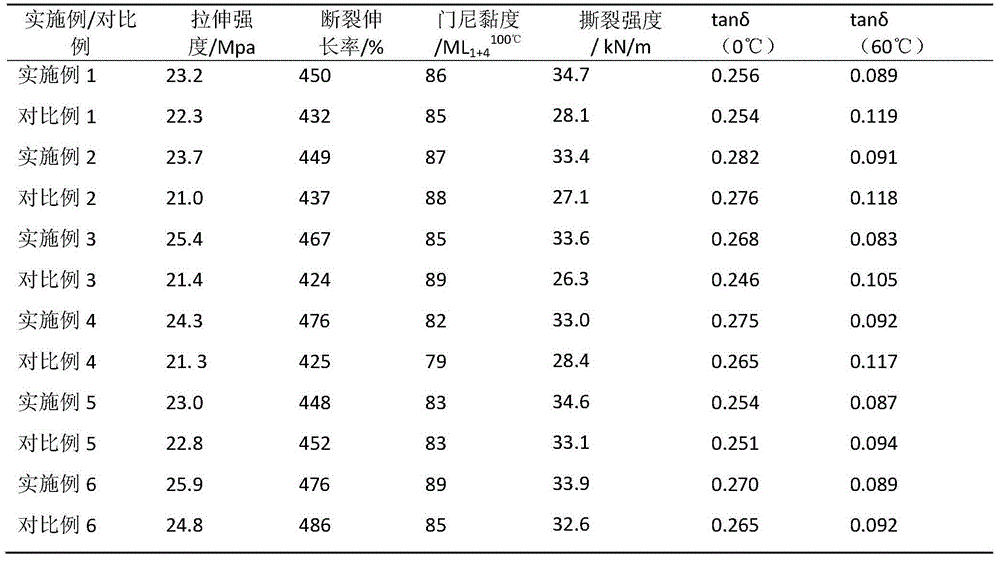Double-end-functionalized ternary copolymer rubber and preparation method thereof
A ternary copolymer rubber, double-ended technology, which is applied in the field of new ternary copolymer rubber, can solve the problems of low functionalization degree of alkoxy groups, low functionalization degree, and insignificant improvement of the dispersion effect of rubber and silica, etc. , to achieve the effect of good solubility
- Summary
- Abstract
- Description
- Claims
- Application Information
AI Technical Summary
Problems solved by technology
Method used
Image
Examples
Embodiment 1
[0025] Under the protection of anaerobic, anhydrous, and argon, add 700ml of hexane and 3mol of metal lithium wire into a 1000ml three-necked flask equipped with a condenser, dropping funnel, and magnetic stirrer, raise the temperature to 50°C, and add Add 1.36 mol of trimethoxy (4-chlorobutoxy) silane solution slowly (dropping rate: 0.03 mol / min) into the three-necked flask, stir while adding, and use cold oil to lower the temperature, and control the reaction temperature at 50-60°C , the dropwise addition time is 1h, after the dropwise addition is complete, the constant temperature reaction is continued for 2h, the crude product is filtered under an inert atmosphere to obtain a functionalized initiator, and finally an organolithium initiator containing silicon ether is obtained for future use.
[0026] In a jacketed 15L stainless steel polymerization kettle, the system was replaced 3 times with argon gas. Add 2654g of cyclohexane, 400g of isoprene, and 0.12g of tetrahydrofur...
Embodiment 2
[0030] Under the protection of anaerobic, anhydrous, and argon, add 700ml of hexane and 3mol of metal lithium wire into a 1000ml three-necked flask equipped with a condenser, dropping funnel, and magnetic stirrer, raise the temperature to 50°C, and add Add 1.36 mol of triethoxy (4-chlorobutoxy) silane solution slowly into a three-necked flask (dropping speed 0.05 mol / min), stir while adding, and use cold oil to cool down, and control the reaction temperature at 50-60°C , the dropwise addition time is 1h, after the dropwise addition is complete, the constant temperature reaction is continued for 2h, the crude product is filtered under an inert atmosphere to obtain a functionalized initiator, and finally an organolithium initiator containing silicon ether is obtained for future use.
[0031] In a jacketed 15L stainless steel polymerization kettle, the system was replaced 3 times with argon gas. Add 1991 g of cyclohexane, 300 g of isoprene, and 0.08 g of tetrahydrofuran into the ...
Embodiment 3
[0035] The preparation of the functionalized catalyst was the same as in Example 1.
[0036] In a jacketed 15L stainless steel polymerization kettle A, the system was replaced 3 times by passing argon. Add 3318g of cyclohexane, 500g of isoprene, and 0.18g of tetrahydrofuran into the polymerization kettle, add 5.0mmol of n-butyllithium, raise the temperature to 70°C, and polymerize for 60min. After the monomer is completely converted, add 2674g of cyclohexane, butane Diene 240g, styrene 160g, tetrahydrofuran 0.24g, reaction temperature 70°C, polymerize for 70min, add cyclohexane 652g, butadiene 100g after complete monomer conversion, maintain reaction temperature 70°C, continue to react for 60min, after the completion of the reaction, pass Inject carbon dioxide gas to carry out capping reaction, and the reaction time is 20min. After the end-capping reaction is completed, add 10 g of antioxidant 1010 [tetrakis-(4-hydroxy-3,5-tert-butylphenylpropionic acid) pentaerythritol ester...
PUM
 Login to View More
Login to View More Abstract
Description
Claims
Application Information
 Login to View More
Login to View More - R&D
- Intellectual Property
- Life Sciences
- Materials
- Tech Scout
- Unparalleled Data Quality
- Higher Quality Content
- 60% Fewer Hallucinations
Browse by: Latest US Patents, China's latest patents, Technical Efficacy Thesaurus, Application Domain, Technology Topic, Popular Technical Reports.
© 2025 PatSnap. All rights reserved.Legal|Privacy policy|Modern Slavery Act Transparency Statement|Sitemap|About US| Contact US: help@patsnap.com

